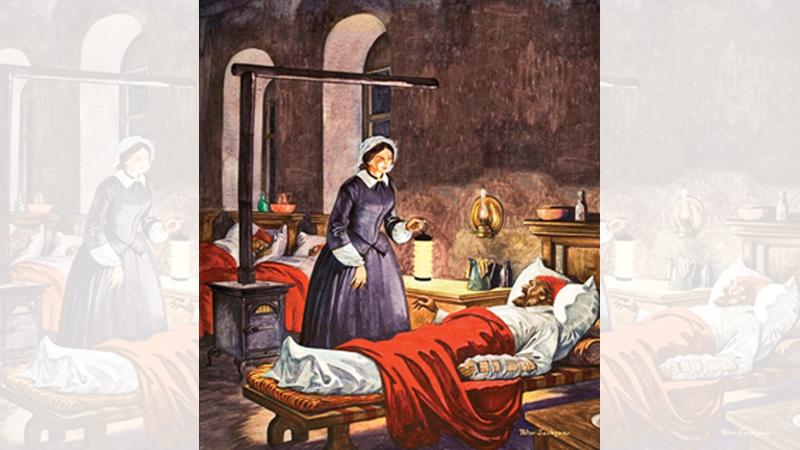
The children sat there patiently waiting for me to arrive. It was dusk and dark. They asked the mother “Mum, where is granny? Shoudn’t she here by now?” The mother sighed, while looking exasperated and said. “You should willingly snuggle into bed and have an enchanted sleep. Anyway, it’s getting late for bed.”
They went upstairs solemnly.
Granny arrives
I rang the bell. They opened the door and suddenly they ran and flung their arms around me. I chuckled at the way they ran. “Granny, will you please tell us a story?” they chorused together pleadingly. I nodded saying “of course”. I took them upstairs.
They tucked themselves comfortably on the bed. I sat there and I began right away.
Florence Nightingale’s story
“Once, there was a young lady who dreamt of becoming a nurse. She read books about nursing and after she was about 16 years she knew being a nurse was her passion and that she had the spirit and ability to become an excellent nurse.
I paused a bit, recalling her life story. Then I went on, “She asked her parents for permission to become a nurse. Alas! They refused her request. In the Victorian era, a young lady who took up a job was treated badly especially by the upper classes. Her parents wanted her to be married to a fine gentleman.” One of the children suddenly gasped and asked, “But granny, how will Florence Nightingale pursue her ambition?” I replied with a laugh. “Save your questions for the last You are getting inquisitive so fast I must say”.
I continued the story and hoped they would understand the importance of nursing later on. “After her nurse’s training at Germany’s Lutheran Hospital headed by Pastor Fliender in Kaiserwerth, Florence decided that she was ready and took up a nurse’s job. How amazing isn’t it? Probably nursing was not a bad job after all. Am I not right?”
Both children said, “Yes” and listened.
“In the early 1860s… no, sorry I mean the 1850s to say accurately, Florence Nightingale worked for a Middlesex sanotarium where she had impressed her employer and was promoted in just a year of working. She had worked hard.
Before long, Nightingale contracted cholera.” I realised just then that both children felt drowsy yet they told me to continue. “The cholera was caused by the unsanitary state that had caused the rapid spread of the disease.
To lower the death rate in hospitals, Nightingale made it her goal to keep hospitals clean and hygienic.”
“Granny, but she got cholera, how would she continue her higher level of work?” one of them asked. I said, “Cholera can be cured and she did have to go through a lot for that.”
Then off I went continuing the rest of the story.
The Crimean War
“In the Crimean War in 1853, the soldiers were being sent to the Black Sea to fight but half of them returned needing medical treatment and were sent to military hospitals. At the point when the hospitals didn’t have enough nurses and doctors to treat the men, they wrote a letter to Nightingale to gather a group of nurses to treat and heal the wounded. Along with her, thirty-four nurses arrived at Scutari.
Nightingale’s observation came out to be successful. Wholeheartedly, she examined the food and water given to the men were contaminated. They didn’t clean the soldiers’ bruises. She discovered that men were dying from typhoid and cholera. Nightingale and her nurses worked on cleaning and hygienically maintaining the hospital. They took care of the men and gave them proper food.”
“Florence Nightingale,” I said proudly, “she saved many lives of the men who fought in the war. She is an example to all nurses in the present day.” Before I could say anything else, the children asked me, “Why is she called ‘The Lady with the Lamp’?” I replied, “Because she would go around at night checking on the men with her lamp”. One of them said, “Granny, one day I am going to be a great person like Florence Nightingale.” I laughed “Why, oh, why not?!”
Kirtimayee Swain
Grade 7
Colombo International School
